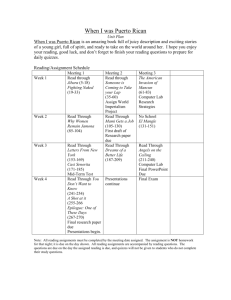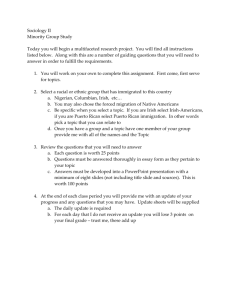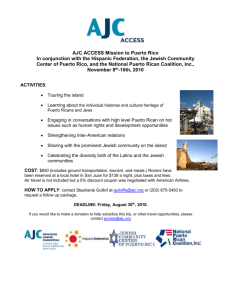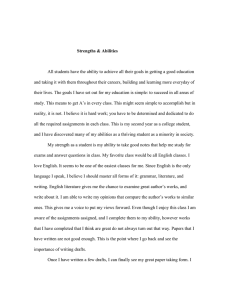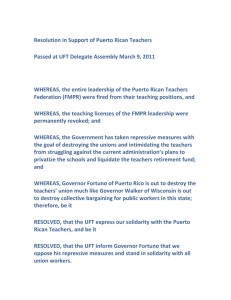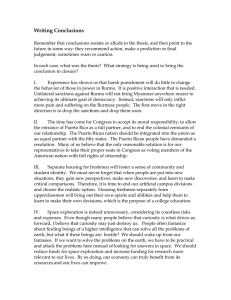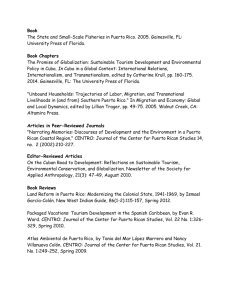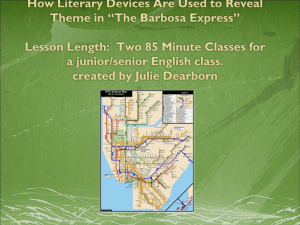Pura Belpré 0
advertisement
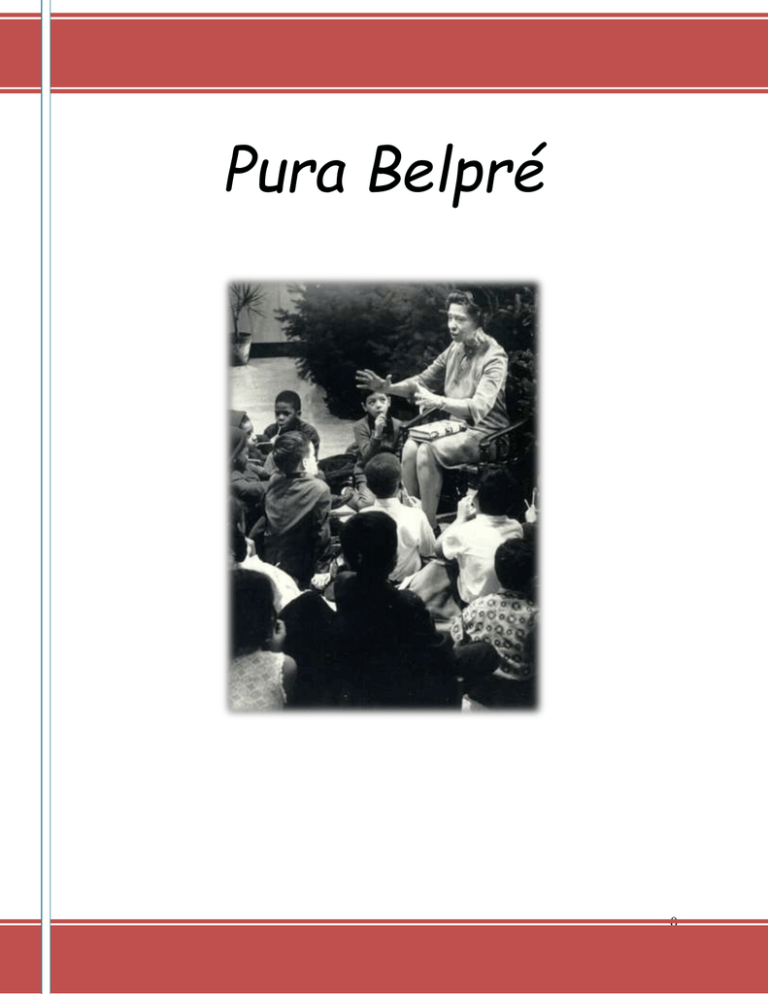
Pura Belpré 0 ELN194 Pura Belpré During the mass exodus of Puerto Ricans from the Caribbean island to the U.S. mainland between the late 1930s and mid-1970s, Puerto Ricans were experiencing many hardships in the U.S. They came in search of economic opportunity. The Puerto Ricans mainly came to live in the five boroughs of New York, especially in the Bronx, Manhattan, and Brooklyn. As newcomers and migrants they faced many challenges such as learning to adjust to a new culture and experienced hardship and discrimination. Puerto Rican pioneers played a huge role in fighting for the rights, working conditions, living conditions, education and employment of Puerto Ricans in New York. Pioneers are people who took leadership and started something positive for the community, excelled in the community, were community organizers, and contributed to the community. They were people who saw a need in the Puerto Rican community and fulfilled that need. Some of the Puerto Rican pioneers are Jesus Colon, Oscar Garcia Rivera, Bernardo Vega, Antonia Pantoja, Rafael Hernandez, Juan Tizol, and many more. The following Puerto Rican pioneer is named Pura Belpré. Belpré pioneered the library’s work with the Puerto Rican community and was the first Puerto Rican to be hired in the New York Public Library. Not only was she the first Puerto Rican to be hired in the New York Public Library but was also a talented author and storyteller. She made many contributions to the community. Pura Belpré was born in Cidra, Puerto Rico. There is an uncertainty about her date of birth but it is believed to be February 2, 1899, December 2, 1901, or February 2, 1903. Her father was a contractor and often moved about the island. The family also moved along with him. 1 According to Belpre, “It gave us an opportunity to live in different towns and enjoy storytelling, which was a natural pastime” (Bennett). As a child she was a lover of nature and the beauty of nature that she saw while growing up in Puerto Rico later on added richness to her writing. As stated by the Center for Puerto Rican Studies, “She graduated from Central High School in Santurce in 1919 and enrolled at the University of Puerto Rico in Río Piedras” (Center for Puerto Rican Studies). Thereafter she interrupted her studies in order to attend her sister’s wedding in New York. Coming to New York opened a new life for her and little did she know that she was going to remain there. Her first job was in the garment industry. Belpré’s “Spanish language skills soon earned her a position as Hispanic Assistant in a branch of the public library at 135th Street in Harlem. She became the first Puerto Rican to be hired by the New York Public Library” (Center for Puerto Rican Studies). The head librarian Miss Ernestine Rose hired her because she wanted to get a Spanish-speaking person to work in the library. She also hired her because she wanted someone to organize her work. Belpré had a passion for story telling, a love for children’s literature and also had interest in leadership. In 1926 she began her official studies in the Library School of the New York Public Library. The first story that Belpré wrote was one of the first books published in English by a Puerto Rican in the United States. The story that she wrote was about romance between a cockroach and a mouse. This was important because it had a positive impact on the Puerto Rican community. She was transferred to the Seward Park branch in lower Manhattan and felt that she had a rewarding experience at 135th Street in Harlem. Belpré felt that it was a rewarding experience because it acquainted her with black culture. As Belpré states, “I experienced the black renaissance of art and literature, and the upsurge of poets, novelists, dramatists and musicians” 2 (Bennett). Seward Park branch in lower Manhattan was the heart of the Jewish community. She was then again exposed to another culture. Storytelling was an important activity in both branches and throughout the community. She was able to build up on her stories. These stories served her for many years. The branch in the Jewish community was very active with activities that were used throughout the community. Belpré was transferred to the public library in Harlem due to the large amounts of Puerto Ricans living there. As stated by the Center for Puerto Rican Studies “She quickly became an active advocate for the Spanish-speaking community by instituting bilingual story hours, buying Spanish language books, and implementing programs based on traditional holidays such as the celebration of Three Kings Day” (Center for Puerto Rican Studies). One very important activity was the creation of the puppet theater. Puppet shows were given in Spanish and English and soon after, began to be given in hospitals, schools, and in parks during the summer. Belpré was mainly the person who started the puppet shows, which was an important part of her Puerto Rican folklore programs. She also attended meetings of civic organizations, in order to make an effort to reach to children and adults and opened programs to expand library services to Puerto Ricans. After getting married, she devoted herself to writing. “Belpré's first book, Pérez and Martina: A Portorican Folk Tale was published by Frederick Warne in 1932. Her second story "The Three Magi" was published in 1944 as part of the anthology The Animals' Christmas by Anne Thaxter Eaton (Center for Puerto Rican Studies). She became a professional writer, editor, and translator. She provided needed services to Latino neighborhoods throughout the Bronx by working in a South Bronx Library Project. This program promoted library use to Latinos. Pura Belpré wrote and translated many children’s books. She was “chief librarian of its first bilingual division” (Crossette). Belpre also worked as a children’s specialist. 3 Pura Belpré made a lot of contributions to the community. She provided a lot of help to Spanish-speaking children in the library, was an author, and storyteller. She was a storyteller and speaker, not only for children but in library schools and schools of education. Puerto Rican children were not being educated well, some faced a language barrier, and didn’t have the right resources for school. Belpré opened the doors for these children and showed them that education is power. Pura Belpré was a very important pioneer who showed the Puerto Rican community the importance of the library and reached out to help the community in many ways. 4 (Source: Center of Puerto Rican Studies) 5 Works Cited Crossette, Barbara. “Latinas Get A Chance To Speak for Themselves; Encyclopedia Focuses On an Unsung Group.” New York Times 1 April 2000. 11 April 2008 <http://query.nytimes.com/gst/fullpage.html?res=9A05E0DC103CF932A35757C0A966 9C8B63&scp=3&sq=pura+belpre&st=nyt>. Hopkins, Lee Bennett. " Belpre, Pura." Biography Reference Bank LaGuardia Community College Library Media Resources Center (1999). 12 April 2008 < http://bb.laguardia.edu/webapps/portal/frameset.jsp?tab_id=_16_1>. Mercado, Carmen and Victoria Núñez, Helga E. Pérez. Center of Puerto Rican Studies. 2005. 11 April 2008 <http://www.centropr.org/prwriters/belpre.html>. 6 Bibliography Crossette, Barbara. “Latinas Get A Chance To Speak for Themselves; Encyclopedia Focuses On an Unsung Group.” New York Times 1 April 2000. 11 April 2008 <http://query.nytimes.com/gst/fullpage.html?res=9A05E0DC103CF932A35757C0A966 9C8B63&scp=3&sq=pura+belpre&st=nyt>. Hopkins, Lee Bennett. " Belpre, Pura." Biography Reference Bank LaGuardia Community College Library Media Resources Center (1999). 12 April 2008 < http://bb.laguardia.edu/webapps/portal/frameset.jsp?tab_id=_16_1>. Mercado, Carmen and Victoria Núñez, Helga E. Pérez. Center of Puerto Rican Studies. 2005. 11 April 2008 <http://www.centropr.org/prwriters/belpre.html>. 7
